The beauty of the Mediterranean diet is that it is not a diet, but the principles of a balanced diet.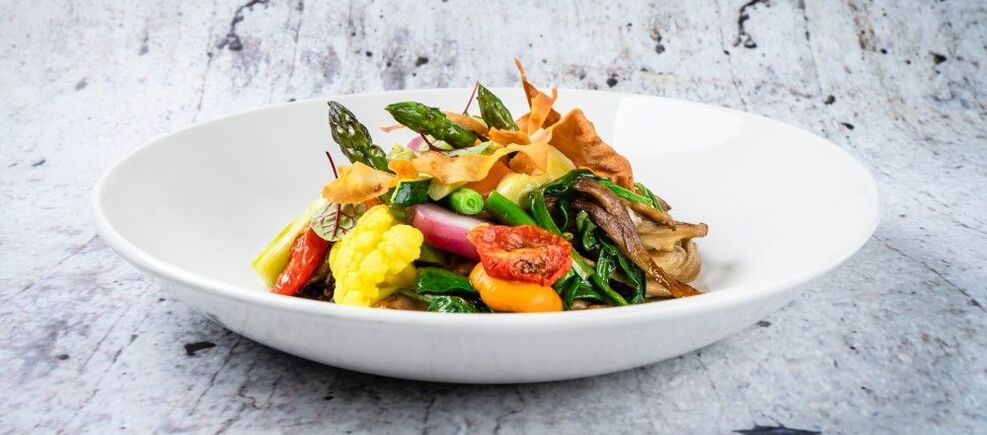 As a rule, almost every diet has severe restrictions, should be carried out under medical supervision, and has contraindications. The Mediterranean diet is suitable for everyone, including children, pregnant women and the elderly. Even if you are allergic or intolerant to certain foods, others can easily replace them. You won't be hungry and stressed out. On the contrary, you will immensely enjoy your meal. It is not for nothing that the inhabitants of these regions have excellent health and a cheerful disposition.
As a rule, almost every diet has severe restrictions, should be carried out under medical supervision, and has contraindications. The Mediterranean diet is suitable for everyone, including children, pregnant women and the elderly. Even if you are allergic or intolerant to certain foods, others can easily replace them. You won't be hungry and stressed out. On the contrary, you will immensely enjoy your meal. It is not for nothing that the inhabitants of these regions have excellent health and a cheerful disposition.
The Mediterranean diet is a lifestyle that allows you to stay in shape, rarely get sick and prolong youth. If you are thinking of adapting your diet to proper nutrition, study the principles of the Mediterranean diet.
In 2010, the Mediterranean Diet received official UNESCO status as the Intangible Heritage of the Mediterranean countries: Greece, France, Italy, Morocco, Spain, Croatia, Cyprus, Portugal.
If we turn to history, we can see that in the gastronomic culture of ancient Greece, and then ancient Rome, all the main ingredients of this diet were already present. Lots of vegetables and fruits, seafood, olive oil, legumes, limited amount of meat and sweets. That said, plant foods that are high in vitamins, minerals, and fiber, high quality protein, healthy fats, and slow carbohydrates. They activate the metabolism, improve digestion, strengthen all functional systems of the body thanks to antioxidants, slow down the aging process, increase the production of happiness hormones, promote beauty and harmony. But the most important thing is that they always make you feel good. In the Mediterranean countries, however, vegetarianism is not very common, while there are practically no red meat dishes, not even those that are too heavy.
Scientists from the Harvard School of Public Health studied the health effects of the Mediterranean diet and concluded that "Mediterranean diet traditions, regular exercise and smoking cessation can prevent more than 80% of coronary heart disease, 70% of stroke and 90% of diabetes 2"Kind ".
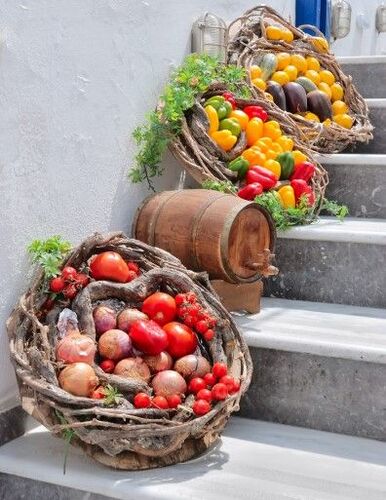
The term itself appeared in the 50s of the twentieth century, it was introduced by a doctor, professor at the University of Minnesota Ansel Keys. In 1945 he landed in Italy with a group of American soldiers. Keys observed the locals and found that they had fewer cardiovascular problems and a longer life expectancy than in his home country. He suggested and then reasoned that this is the result of a lifestyle and eating system. A little earlier, in the late 1930s, the Italian nutritionist Lorenzo Piroddi first linked diet and susceptibility to diseases such as diabetes, obesity and bulimia, which is why he is referred to as the "father" of the Mediterranean diet. And Ansel Keys stayed on the coast in Italy andturned 100 years old.
Let's list the benefits of a Mediterranean diet.
Strengthens the cardiovascular system. Omega fatty acids from olive oil, nuts, seeds, and certain types of vegetables and fruits keep blood vessels clean and elastic.
Prevents or treats diabetes as the diet is dominated by low glycemic index foods and almost no sugar is used, which means fast carbohydrates.
Foods rich in fiber are included in every meal, they guarantee a good metabolism, contribute to gentle weight loss and positive dynamism, improve the state of the nervous system, improve mood and stimulate brain activity.
Many foods in the Mediterranean diet promote the synthesis of endorphins, dopamine, serotonin and tryptophan, the so-called happiness hormones. This reduces the risk of developing Parkinson's disease, Alzheimer's disease and dementia in old age.
Conversations with friends, long Sunday dinners with the family, picnics in nature, cooking together are part of the culture of the Mediterranean countries, which can be introduced into everyday life in order to minimize stress and anxiety and to strengthen positivity.
Extends youthfulness and beauty thanks to flavonoids and antioxidants. They reduce the damage caused by the oxidative process that worsens both the internal and external condition. Selenium, manganese, zinc, vitamins A and E make the skin firm and the hair shiny and thick.
The Mediterranean diet has practically no disadvantages.
It will help you switch to proper diet and improve your health. It is not seasonal, not limited in time and implies a varied menu. Their only downside is the inability to lose weight quickly.
In fact, however, it becomes a plus. A dramatic weight loss is often traumatic for the body: We experience stress through a strong change in the regime, a noticeable loss of the usual daily intake of calories. The body responds with poor health, declining strength, immunity and mood, chronic diseases worsen or new ones arise when the diet is uncontrolled.
Yes, the weight has been going away quickly for some time, but the brain switches on the protection mode against possible hunger, and even from low-calorie food the body manages to store fat in reserve. Therefore, most often after the end of the diet, the weight returns, and sometimes even increases.
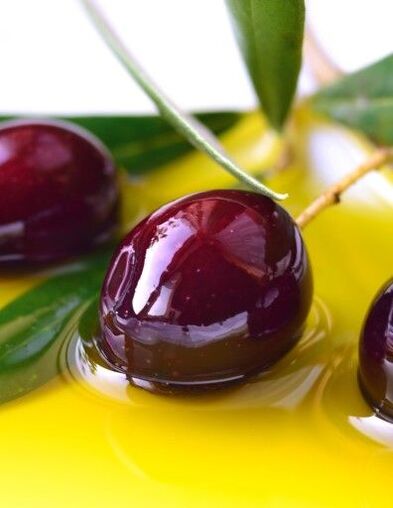
This will not happen with the Mediterranean diet. You won't see any quick changes, but be patient. You will notice the first results in a couple of months. You should eat small portions five times a day - so that you do not feel hungry and the body receives the full range of necessary nutrients. Gradually, a rational diet will restart the body's functional systems, metabolism will improve, and weight will return to normal. Add physical activity, at least long walks, and the effect will be felt.
The list of approved products is extensive. Nutritionists have identified them in a pyramid based on (60%) sources of complex carbohydrates, high quality fats and vegetables. The former include whole grain products, durum wheat pasta, whole grain bread, nuts and seeds, and legumes. Products of this group should be included in the menu every day.
Vegetables are presented in all variations. Pay particular attention to leafy greens like spinach and kale and vegetables with a minimum of starch like eggplant and zucchini, cauliflower and broccoli, tomatoes, peppers and fennel. The WHO recommended daily intake of vegetables - 6 servings per day - is precisely based on the amount of vegetables in the Mediterranean diet.
In the past, when there were no modern technologies for preserving vegetables, cooking was based on the principle of seasonality. Unfortunately, in our conditions, seasonal vegetables are a short-lived pleasure. There is a solution: use frozen vegetables. In contrast to imported products, shock freezing, which is carried out at the peak of ripeness within a few hours of harvesting, retains almost all of the vitamins. In winter and spring, the freshness of vegetables is a rather arbitrary term. Manufacturers take into account the long journey and the storage for which they handle them with chemicals.
Chickpeas, lentils and beans contain complete vegetable protein, a rich nutrient complex and fiber. They satiate well and provide a feeling of satiety for a long time. Combined with legumes, a wide variety of balanced meals can be prepared. Thick, filling soups will keep you warm in cold weather, and salads are a great option for dinner. Try to have vegetables and legumes for dinner two to three times a week.
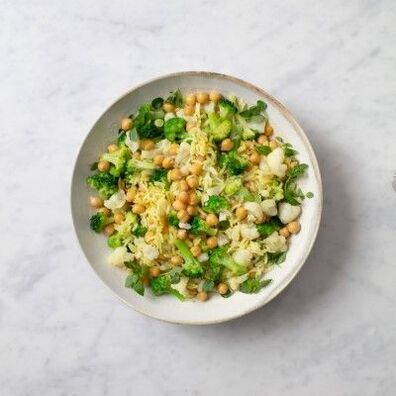
Jasmine rice with chickpeas, mini broccoli, mini cauliflower and truffle oil
Ingredients:
- Chickpeas (chickpeas) Bonduelle 1 can (310 g).
- Mini broccoli Bonduelle 1 package (300 g).
- Cauliflower Mini Bonduelle 1 package (300 g).
- Jasmine rice 200 g.
- Basil 40g.
- Curry 1 tsp
- Olive oil 20ml.
- Salt to taste.
Recipes:
- Cook the rice according to the instructions. Add the curry, stir.
- Heat olive oil in a pan and fry the cabbage and broccoli lightly.
- Mix the cabbage, chickpeas and rice, stir. Salt if necessary. Garnish with basil leaves before serving.
Noodles are not bad when made from durum wheat flour: they are low in calories, rich in vitamins and minerals, and easy to digest. In addition, pasta such as cereals are one of the main sources of vitamin B. Noodles made from unrefined flour give the body energy; for example, it is recommended to consume it before physical activity.
Of course, if you accompany the dish with a fatty sauce or serve as an accompaniment to meat, all the benefits can be negated - such a portion has nothing to do with the traditions of the Mediterranean. For pasta, light sauces based on olive oil, vegetables, fish and seafood are the right choice.
Spaghetti with mini broccoli and pine nuts
Ingredients:
- Broccoli pack (300 g).
- Spaghetti 250g.
- Pine nuts 40 g.
- Olive oil 20ml.
- Ricotta 100g.
- Salt to taste.
Recipe:
- Cook the spaghetti until al dente.
- Cook broccoli according to the instructions.
- Chop 100 g broccoli with a blender. Mix with ricotta and olive oil.
- Mix together the spaghetti sauce and the remaining broccoli, season with salt and heat in a saucepan over low heat for 2 minutes.
- Fry the pine nuts in a dry pan and sprinkle over the spaghetti before serving.
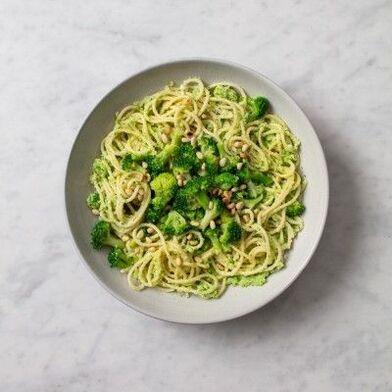
Olive oil, the be-all and end-all of the Mediterranean diet, is the gastronomic symbol of this region. Olives were consumed here thousands of years ago. If left untreated, they taste very bitter, which is why they are salted or pressed from oil.
The reason for this is the substance oleuropein, a phenolic compound that, together with omega fatty acids and vitamin E, determines the effect of olives. Phenols are powerful antioxidants, have antibacterial and anti-inflammatory properties, and fight free radicals. Scientists have found that 2-4 tablespoons of olive oil per day significantly reduce the risk of coronary artery disease.
Has made a mention of vitamin F, don't be surprised. Not many people know that essential fatty acids have a common name - vitamin F. These are archidonic, linoleic, and linolenic acids. The human body does not produce them and only takes them in with food.
But remember that not all olive oils are made equal. The best is Extra Vergin, a cold-pressed oil that is made mechanically. Its acidity, ie the content of organic acids, does not exceed 0. 8%. During the manufacturing process, this oil fully retains vitamins and antioxidants and should be stored in dark glass bottles at room temperature. It must not be heat treated.
Add olives yourself anywhere: in salads, soups, main dishes, pies, toast or to an omelette. Olives have a salty taste, with them the dishes do not need to be additionally salted, which reduces the consumption of salt. Let yourself be inspired by our selection of olive recipes.
The second step of the pyramid is the sources of the right protein, which makes up 30% in the Mediterranean diet. Part of the body gets proteins from plant-based foods, mainly fish and seafood, natural yogurt, cottage cheese, low-fat cheeses (goat's and sheep's milk cheeses are particularly popular), white meats (chicken, turkey, rabbit) and eggs. Food in this group should be consumed three to four times a week.
Fish should not only be eaten on Thursdays, as the book suggests tasty and healthy food, but several times a week. If you choose between the river and the sea, choose the second and greasy option. This not only gives you protein, but also omega-3 acids, iodine, which is rarely found in food, and an excellent vitamin complex: A, E, D, C, B. dense structure of muscle fibers. Hence, they are digested instantly, which makes fish an ideal diet product.
When people talk about fish, they often complain that they are expensive and that it is almost impossible to buy good fish. Let's clear up these exciting questions.
In fact, few people manage to buy freshly caught fish. In this case, as with vegetables, do not be afraid of freezing. Follow the rules of thawing: on the bottom rail of the refrigerator, which lasts 10-12 hours and retains all the nutrients. As with vegetables, when buying, make sure that there are no ice crystals in the packaging. They are proof that the fish was stored incorrectly: the temperature regime was not observed. Also, don't freeze the fish yourself.
Fish is an expensive product in all countries, but here too there is a way out. You can not afford salmon or tuna fillets, buy cheaper varieties: cod, mackerel, pink salmon, herring, halibut, flounder, lizard, sardines. Basically, most families in the Mediterranean countries cook from these types of fish, the dishes with them are very tasty and varied. Many people ignore canned tuna, but in vain: it is much cheaper than fresh and just as healthy if it is made in its own juice rather than in oil. Cooking salads with it is a pleasure: you don't have to worry about cutting.
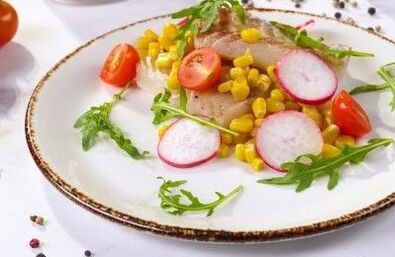
Cod fillet with corn
Ingredients:
- Jungmais Bonduelle 1/3 can (140 g).
- Cod fillet 200 g.
- Radish 2 pcs.
- Cherry tomatoes 5 pcs.
- Lemon zest 2 pinches.
- Lemon juice 1 tsp
- Any green to taste.
- Rocket for serving.
- Salt and pepper to taste.
Recipe:
- Dry the cod fillets, remove the bones with tweezers and place the fish in a baking dish. Then lightly drizzle with lemon juice, rub with a mixture of salt-pepper-spices and lemon peel and bake in the oven at 180 degrees for 15-25 minutes, depending on the size of the fillet.
- Halve the cherry, cut the radish into slices. Chop the herbs.
- Place the finished cod fillet on a serving platter. Place a garnish of corn, tomatoes, radishes and herbs nearby. Garnish with rocket.
The same goes for seafood: instead of targeting lobsters, oysters and lobsters, we take a closer look at mussels and shrimp. Iodine, selenium, zinc, iron, copper, magnesium - this is not an exhaustive list of the minerals in it plus low calorie content. Shrimp are rich in vitamin B12 - it participates in the production of hemoglobin, and in mussels - vitamin E, which protects cell membranes from destruction.
The last 10% contains red meat, which should be eaten no more than once a week, animal fats and simple carbohydrates. Try to cook meat gently - braise it or bake it and roast it on the grill without oil. Without desserts, life will be deprived of sweet joy, but still choose healthy desserts. Use a minimum of sugar, the natural sweetness of fruits, honey and even vegetables will suffice. Young corn, for example, is sweet in itself, the desserts that go with it are tasty and original and you can also eat it straight from the can.

Fruit salad with young corn
Ingredients:
- Jungmais Bonduelle 1 can (340 g).
- Blueberries 70g.
- Strawberry 70 g.
- Raspberry 70g.
- Orange 1 pc.
- Walnut 80 g.
- Natural yogurt 400ml.
Recipe:
- Peel off the peel from the orange. Cut the orange into slices.
- Drain the corn can. Mix the corn and berries.
- Chop walnuts and add to the yogurt, mix.
- Put fruit salad with young corn in small bowls, add yogurt with walnuts. Serve with a slice of orange.
Finally, a few words about spices.
The aromas of sunny heat and Mediterranean gardens are found in rosemary, sage, thyme, marjoram. Parsley and garlic are the simplest and cheapest spices that the region's chefs have used for centuries. A mixture of allspice, Provencal or Italian herbs will fill the dishes with meaning and interesting nuances. In addition, you can use less salt - the brightness of the spices is enough for a full-fledged taste.

There are practically no forbidden foods in the Mediterranean diet and their list coincides with that of all nutritionists. These are fast food and all "junk" food, industrial semi-finished products, sauces, sweets with preservatives and flavor enhancers.
Drink plenty of water, don't neglect a glass of dry red wine (but no more! )













































































